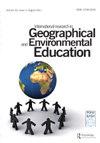通过在线情景游戏实现基于游戏的城市旅游教育电子学习
IF 3.1
Q2 EDUCATION & EDUCATIONAL RESEARCH
International Research in Geographical and Environmental Education
Pub Date : 2020-10-01
DOI:10.1080/10382046.2019.1698834
引用次数: 15
摘要
摘要本文通过一个假设城市的情景游戏,介绍了一种用于城市旅游教育的电子学习。这个场景游戏为旅游地理和规划教育中集成电子学习、游戏化和基于场景的平台组件树立了一个很好的榜样。本研究评估了城市旅游情景游戏在知识丰富、态度转变和平台可用性方面的有效性 = 30)。游戏的总体有效性总体上是积极的。配对抽样t检验结果表明,该游戏平台成功地提高了参与者对城市旅游背景下新概念、新模式和新问题的基础知识。社会科学中旅游研究的性质涉及感知和观点的动态性,从而导致游戏参与者的态度变化,尽管这些变化仅在四分之一的态度属性中具有统计学意义。可用性是游戏的缺点,因为除了一些技术元素之外,这个维度很难控制。从统计结果来看,除了游戏的教育设计外,游戏对可用性的期望并不高。通过巧妙地整合学习模式和其他电子学习元素,对提高旅游教育中游戏学习的有效性提出了一些讨论和建议。本文章由计算机程序翻译,如有差异,请以英文原文为准。
Game-based e-learning for urban tourism education through an online scenario game
Abstract This paper introduces an e-Learning for urban tourism education through a scenario-based game of a hypothetical city. This scenario game set a good example to integrate components of e-Learning, gamification and scenario-based platform in tourism geography and planning education. This study evaluated the effectiveness of urban tourism scenario game in terms of knowledge enrichment, attitudinal change and platform usability reported by a sample of voluntary university students (n = 30). The overall effectiveness of the game is found generally positive. Paired-sampled t-test results show that this game platform is successful in improving participants’ fundamental knowledge about new concepts, models and issues in the urban tourism context. The nature of tourism study in social science involves dynamism of perception and views, and thus leading to attitudinal changes of the game players although these changes are only statistically significant in one-fourth of the attitudinal attributes. The usability is the shortcomings of the game since this dimension is difficult to control except some technical elements. From the statistical results, the game does not reach a high expectation of usability except the educational design of the game. Some discussions and suggestions are made to enhance the effectiveness of game-based learning in tourism education through clever integration of modes of learning and other e-Learning elements.
求助全文
通过发布文献求助,成功后即可免费获取论文全文。
去求助
来源期刊

International Research in Geographical and Environmental Education
EDUCATION & EDUCATIONAL RESEARCH-
CiteScore
5.20
自引率
33.30%
发文量
11
期刊介绍:
International Research in Geographical & Environmental Education publishes quality research studies within the context of geographical and environmental education. The journal endeavours to promote international interest and dissemination of research in the field, provides a forum for critique, and demonstrates the relevance of research studies to good professional practice.
 求助内容:
求助内容: 应助结果提醒方式:
应助结果提醒方式:


